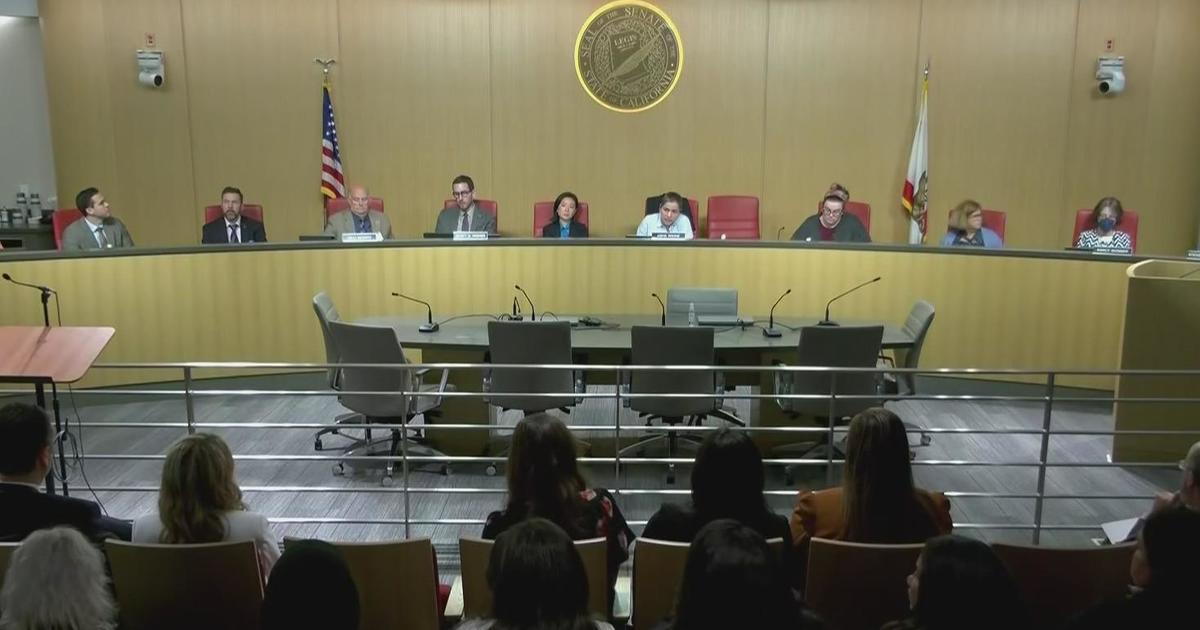Uncommon Knowledge
Newsweek is committed to challenging conventional wisdom and finding connections in the search for common ground.

SACRAMENTO — A California bill that pushes for harsher penalties against people who buy sex from children moved forward Tuesday, but not without a fight between members of the public safety committee and the bill’s author Senator Shannon Grove.
The original bill, authored by Senator Shannon Grove, would make soliciting a minor for sex, agreeing to engage or engaging in any form of commercial sex with a child a felony offense with a sex offender registry required on repeat offenses.
However, Democrats on the public safety committee amended the bill to exempt 16- and 17-year-olds from the penalties and reduce the punishment from two years in prison to up to a year in county jail.
Grove got emotional while addressing the committee about the changes made to the bill.
“You have a committee forcing amendments in front of survivors that are advocating for this bill,” Senator Grove said. “I’m incredibly disappointed that not only did my colleagues reject my proposal to make the buying of children for sex a prison felony, but that I was blindsided when they amended my bill without my consent.”
Those against the bill including Senator Scott Wiener said they fear it could target the wrong people by punishing young adults in consensual relationships with minors.
“This bill goes well beyond human trafficking. I think human trafficking, we should throw the book at them. This bill would sweep in a lot of people who are not trafficking. This bill will send people to state prison, on the sex registry, which is basically in many ways the end of their life,” Sen. Wiener said.
Shane Harris, President of the People’s Association of Justice Advocates, joined alongside Sen. Grove in a press conference before the committee hearing to express support for the bill. As a criminal justice advocate, Harris said this would protect the most vulnerable Californians.
“Part of the reason that I’m supporting the bill and what, and have been supporting it, is because 60% of trafficked victims are actually fostered youth, or have been in foster care,” Harris, who is a former foster child himself, said.
He also disagreed with the move to make amendments.
“I think it is just completely delirious that these senators who sit on this committee, some of them decided to go the way of amending the bill without the author’s consent,” Harris said. “It explains where we are in this state when it comes to how we view our children and our most vulnerable children.”
The author, along with advocates, accused the committee of watering down the bill to the point they may not support it moving forward.
“It does not roll the clock back on criminal justice reform. If you think that it does, you cannot tell time and it’s time to hold these perpetrators of child sex trafficking accountable in this state,” Harris said.
In a statement responding to changes made and the future of the bill Senator Grove’s office said:
“Senator Grove is actively discussing the next steps with her joint authors, coalition of survivors and advocates who are deeply invested in the outcome of this bill.”


A 16-year-old boy has been charged in the killing of a beloved middle-school teacher during a burglary in central California last year.
Officers found Sergio Martin, a 50-year-old teacher for the Cutler-Orosi Joint Unified School District, dead from multiple gunshot wounds in his home in Dinuba at around 3 a.m. on Nov. 6, 2023. At the time, police described the shooting as a random act of violence and said the suspect was not a former student of Martin’s.
The teenager was charged with murder and burglary, among other counts, the Tulare County District Attorney said Monday. The teen was arraigned in Tulare County Juvenile Court on Friday.
Under California law, the boy will be tried as a juvenile because he was 15 at the time of the killing. If convicted, he can only remain in custody until the age of 25.
Two others were charged with burglary in connection to the crime, according to the district attorney’s office.
Jorge Arrieta, 21, and Joseph Garcia, 20, were charged with second-degree burglary and accessory. Arrieta is also charged with having stolen property, according to the prosecutor.
The two were arrested on Friday, with Arrieta remaining in custody and arraigned on Monday. Garcia was released on bail and is scheduled to return to court on May 22 for his arraignment.
USA TODAY was working to track down attorneys for Arrieta and Garcia for comment.
Martin taught Spanish at El Monte Middle School for 17 years. Following his death, students and teachers at the school posted dozens of notes with letters and pictures outside his classroom. One of them said, “I am sorry,” while another simply said: “We will miss you, Mr. Martin.”
The educator was a dedicated fan of the Los Angeles Dodgers, his colleague Chris Velasco told KFSN-TV in November.
Emilio Botello, one of Martin’s close friends, said he deeply cared about his parents and students and was enthusiastic about his vinyl record collection.
“Beyond his teachings and in the classroom, he’s affected many kids, but to adults that’s not that easy, it’s not that easy and he’s done that,” Botello told KFSN.
Contributing: Eric Woomer, Visalia Times-Delta

Extreme snowfall will become less common in California by 2100, a new study found.
Scientists understand how a lack of snow or “snow drought” can affect a region, especially in the midst of a warming climate. However, before now, they did not understand the impact of unusually high levels of snow. And this is becoming more important, as California has just emerged from its second winter of high snowfall.
A new study published in the Proceedings of the National Academy of Sciences used the 2023 winter as a case study to learn more. Computational hydrologist Adrienne Marshall and colleagues from the Colorado School of Mines dubbed the term “snow deluges” to describe the phenomenon recently seen in California.
To reach their findings, they analyzed the unusual snow deluge across the Sierra Nevada mountains in 2023 to assess the impact of “high snow years.”
In 2023, California saw an extremely high amount of snow accumulation, with record snowpack levels. Observations showed the accumulations were a “once-in-54-years event,” with some areas reporting “once-in-320-years accumulations,” the study reported.
By looking at climate projections, scientists found that years like these with the so-called “snow deluges” are set to decline by 58 percent by the end of this century. Years with median levels of snowfall are also estimated to decline by 73 percent, they reported.
“California’s massive snow year of 2023 was record-breaking at 42 percent of snow monitoring sites,” Marshall told Newsweek. “Climate models indicate that in warmer future climates, our biggest snow years will be smaller than our biggest snow years now. Another way of putting this is that a snow deluge like we saw in 2023 would be much more rare in a warmer climate like that we might expect later in the 21st century.”
Similar patterns will also be seen across the wider Western U.S., the study reports.
The findings “underscore the significance of uncovering the impact of climate change on the dynamics of snow deluges and snow droughts in mountainous regions,” the study reports.
“These findings align with a bigger scientific picture that shows declining average snowpack and more frequent snow droughts in California and throughout the West,” Marshall said. “Our new findings suggest that we shouldn’t count on big snow years like the one we had last year to save us in warmer climates.
“This is important because snow acts as a natural reservoir in the mountains that stores water until the late spring and summer when we need it most. Our best opportunities to avoid the worst consequences of this snow loss lie in reducing our greenhouse gas emissions and finding ways to adapt to adapt to changing snow and water availability.”
The study notes that snow deluges can be “both destructive and beneficial” meaning better understanding of the phenomenon can improve management of “snow-dependent ecosystems and economies.”
The 2023 snow deluge in California, in many ways, could be seen as good thing. Before it occurred, the state had been suffering from prolonged drought conditions. As a result, there was a severe lack of snowpack in the surrounding mountains, meaning less water was feeding the state’s reservoirs.
The large snow build-up, however, meant that come spring, it melted into rivers and reservoirs, saving the state from a water crisis. In fact, drought conditions in the state officially ended.
However, the heavy snowfall indicates that climate change is worsening, as weather patterns become more unpredictable and extreme. While the drought has ended for now, climate change could cause another prolonged dry period in the future.
“Snow is important for both ecosystems and water resources, and there’s a lot still to learn about how our biggest snow years—or the loss of them—impact these systems,” Marshall said. “The present study focuses on annual-scale snow deluges, but the largest individual snowfall events could change in different ways.
“We focused on a moderate warming scenario in California and the Western U.S., but it would also be helpful to learn more about how different climate scenarios could affect snow deluges in other parts of the world.”
Do you have a tip on a science story that Newsweek should be covering? Do you have a question about California snowfall? Let us know via science@newsweek.com.
Newsweek is committed to challenging conventional wisdom and finding connections in the search for common ground.
Newsweek is committed to challenging conventional wisdom and finding connections in the search for common ground.

Former Fosters Freeze assistant general manager Monica Navarro reacts to the sudden closure and how others are responding on ‘The Bottom Line.’
Prices at Chipotle, McDonald’s and other fast-food giants in California are rising after a minimum wage hike went into effect.
“Chipotle said in an investor call Wednesday that prices at its nearly 500 California restaurants climbed 6% to 7% during the first week of April compared with last year, playing out across its menu,” The Wall Street Journal reported Sunday.
“The state isn’t making it easy,” Chipotle Chief Executive Brian Niccol reportedly said.
CALIFORNIA’S $20 MINIMUM WAGE FOR FAST-FOOD WORKERS GOES INTO EFFECT
Prices at Chipotle, McDonald’s and other fast-food giants in California are rising after a minimum wage hike went into effect. (Getty Images)
“I feel ripped off a little,” Greg LaVay said of rising prices at McDonald’s.
Prices for Chick-fil-A in Los Angeles are also putting the squeeze on customers.
“The price for a spicy chicken sandwich at that location had gone up to $7.09 from $6.29, or 13%, since mid-February, according to research by Gordon Haskett Research Advisors,” The Journal revealed. “Chick-fil-A’s prices increased 10.6% on average in California during that time period, Gordon Haskett found.”
California’s new law boosting the minimum wage for fast-food workers in the state to $20 an hour went into effect on April 1, impacting restaurants that have at least 60 locations nationwide, except those that make and sell their own bread.
Gov. Gavin Newsom signed the legislation, AB 1228, into law in September.
The overall minimum wage for other workers in California is $15.50 an hour, among the highest of any state. The federal minimum wage, which has remained unchanged since 2009, is $7.25 an hour, or $15,080 a year for an employee working 40 hours a week.
CALIFORNIA FOOD CHAINS LAYING OFF WORKERS AHEAD OF NEW MINIMUM WAGE LAW

Los Angeles, CA – September 28:Gov. Gavin Newsom signs legislation raising California fast food workers minimum wage to $20 an hour at SEIU Local 721 in Los Angeles on Thursday, September 28, 2023. Newsom gave Anneisha Williams, who works at Jack in ( Sarah Reingewirtz/MediaNews Group/Los Angeles Daily News via Getty Images) / Getty Images)
Other companies, including Chick-fil-A, Domino’s, Burger King, Pizza Hut, and Jack in the Box have also raised prices since September, The Journal reported.
Chipotle, McDonald’s and Gov. Newsom’s office did not respond to a request for comment from Fox News Digital.
GET FOX BUSINESS ON THE GO BY CLICKING HERE
Fox Business’ Breck Dumas contributed to this report.


Shipping firms plead for UN help amid escalating Middle East conflict


ICE chief says this foreign adversary isn’t taking back its illegal immigrants


'Nothing more backwards' than US funding Ukraine border security but not our own, conservatives say


The San Francisco Zoo will receive a pair of pandas from China


Two Mexican mayoral contenders found dead on same day


Brussels, my love? The EU single market is not sexy enough for voters


Republican aims to break decades long Senate election losing streak in this blue state


EU sanctions extremist Israeli settlers over violence in the West Bank